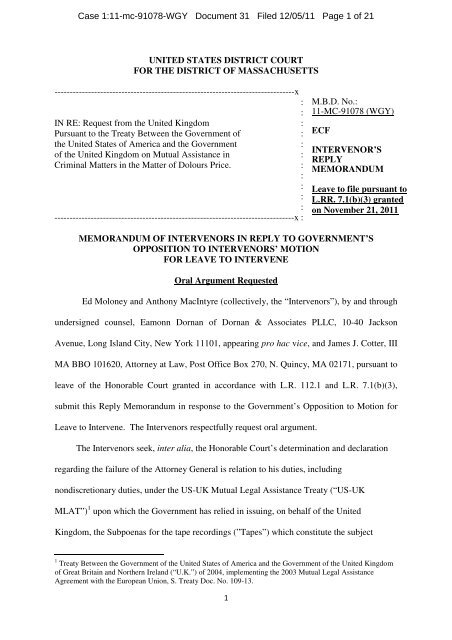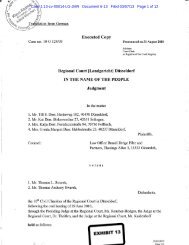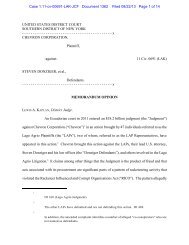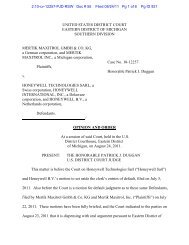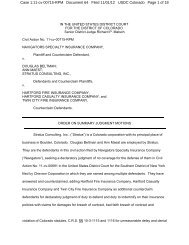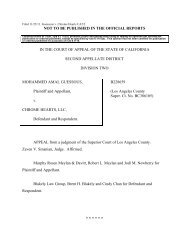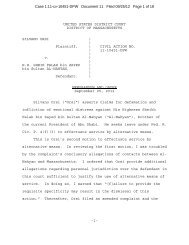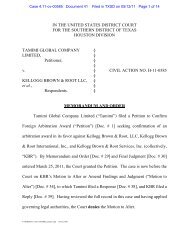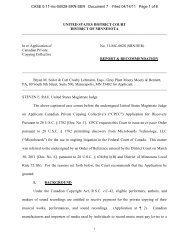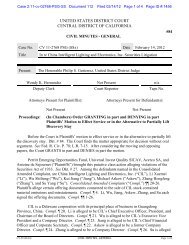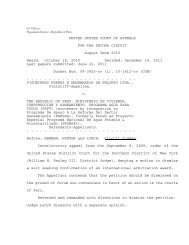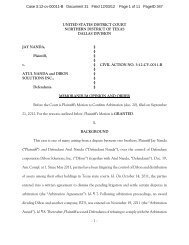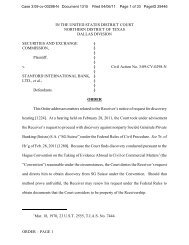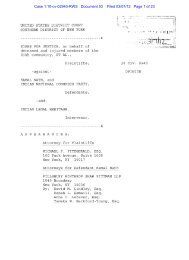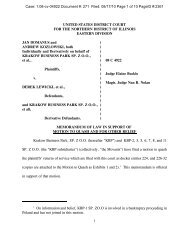UNITED STATES DISTRICT COURT FOR THE ... - Letters Blogatory
UNITED STATES DISTRICT COURT FOR THE ... - Letters Blogatory
UNITED STATES DISTRICT COURT FOR THE ... - Letters Blogatory
You also want an ePaper? Increase the reach of your titles
YUMPU automatically turns print PDFs into web optimized ePapers that Google loves.
Case 1:11-mc-91078-WGY Document 31 Filed 12/05/11 Page 1 of 21<br />
<strong>UNITED</strong> <strong>STATES</strong> <strong>DISTRICT</strong> <strong>COURT</strong><br />
<strong>FOR</strong> <strong>THE</strong> <strong>DISTRICT</strong> OF MASSACHUSETTS<br />
-------------------------------------------------------------------------------x<br />
IN RE: Request from the United Kingdom<br />
Pursuant to the Treaty Between the Government of<br />
the United States of America and the Government<br />
of the United Kingdom on Mutual Assistance in<br />
Criminal Matters in the Matter of Dolours Price.<br />
-------------------------------------------------------------------------------x<br />
1<br />
:<br />
:<br />
:<br />
:<br />
:<br />
:<br />
:<br />
:<br />
:<br />
:<br />
:<br />
:<br />
M.B.D. No.:<br />
11-MC-91078 (WGY)<br />
ECF<br />
INTERVENOR’S<br />
REPLY<br />
MEMORANDUM<br />
Leave to file pursuant to<br />
L.RR. 7.1(b)(3) granted<br />
on November 21, 2011<br />
MEMORANDUM OF INTERVENORS IN REPLY TO GOVERNMENT’S<br />
OPPOSITION TO INTERVENORS’ MOTION<br />
<strong>FOR</strong> LEAVE TO INTERVENE<br />
Oral Argument Requested<br />
Ed Moloney and Anthony MacIntyre (collectively, the “Intervenors”), by and through<br />
undersigned counsel, Eamonn Dornan of Dornan & Associates PLLC, 10-40 Jackson<br />
Avenue, Long Island City, New York 11101, appearing pro hac vice, and James J. Cotter, III<br />
MA BBO 101620, Attorney at Law, Post Office Box 270, N. Quincy, MA 02171, pursuant to<br />
leave of the Honorable Court granted in accordance with L.R. 112.1 and L.R. 7.1(b)(3),<br />
submit this Reply Memorandum in response to the Government’s Opposition to Motion for<br />
Leave to Intervene. The Intervenors respectfully request oral argument.<br />
The Intervenors seek, inter alia, the Honorable Court’s determination and declaration<br />
regarding the failure of the Attorney General is relation to his duties, including<br />
nondiscretionary duties, under the US-UK Mutual Legal Assistance Treaty (“US-UK<br />
MLAT”) 1 upon which the Government has relied in issuing, on behalf of the United<br />
Kingdom, the Subpoenas for the tape recordings (”Tapes”) which constitute the subject<br />
1 Treaty Between the Government of the United States of America and the Government of the United Kingdom<br />
of Great Britain and Northern Ireland (“U.K.”) of 2004, implementing the 2003 Mutual Legal Assistance<br />
Agreement with the European Union, S. Treaty Doc. No. 109-13.
matter of this case. The Government submits in its Opposition to Motion for Leave to<br />
Intervene that the Intervenors are foreclosed by Article 1, § 3 of the US-UK MLAT from<br />
challenging any such failure of the Attorney General, and that, effectively, the Government’s<br />
actions or inactions arising from its international obligations under the US-UK MLAT are<br />
immune from judicial review.<br />
The Government, in submitting that the Intervenors have no constitutional claims under<br />
the First and Fifth Amendments, further seeks to restrain the jurisdictional reach and scope of<br />
the Constitution of the United States, which the Attorney General is sworn to support and<br />
defend. The Government further argues that Rule 24 of the Federal Rules of Civil Procedure<br />
is inapplicable, and the Intervenors submit that intervention by right or permissive is<br />
warranted.<br />
Case 1:11-mc-91078-WGY Document 31 Filed 12/05/11 Page 2 of 21<br />
A. The Intervenors’ Federal Law Rights have not been Extinguished by the<br />
Provisions of the US-UK MLAT<br />
The Government posits that the Intervenors are barred from asserting any private right<br />
of action pursuant to Article 1, § 3 of the US-UK MLAT, which states that the Treaty “is<br />
intended solely for mutual legal assistance between the Parties. . . [and] shall not give rise to<br />
a right on the part of any private person to obtain, suppress, or exclude any evidence, or to<br />
impede the execution of a request.” However, this provision is best understood by reference<br />
to the original, master agreement, namely the Agreement on Mutual Legal Assistance<br />
Between the United States of America and the European Union (“Master MLAT”), which<br />
contains the additional language that an MLAT shall not “expand or limit rights otherwise<br />
available under domestic law.” Master MLAT at Article 3(5), emphasis added. Neither does<br />
the absence of this language in the US-UK MLAT lead to any express limitation of rights<br />
available under domestic law.<br />
More particularly, in issuing the subpoenas, the Government could not rely on any<br />
provision of the US-UK MLAT, but was required to invoke the Honorable Court’s<br />
2
Case 1:11-mc-91078-WGY Document 31 Filed 12/05/11 Page 3 of 21<br />
discretionary authority under 18 U.S.C. §3512, which in turn allows the Intervenors to raise a<br />
challenge under F.R. Crim.P. 17(c)(2), pursuant to which the Honorable Court may quash the<br />
subpoenas if compliance would be “unreasonable or oppressive.”<br />
As 18 U.S.C. §3512 came into effect on October 19, 2009, after the self-executing US-<br />
UK MLAT, the Honorable Court is not faced with the same dilemma as the Ninth Circuit in<br />
In re Premises Located at 840 140th Avenue NE, Bellevue, Washington, 634 F.3d 557 (9th<br />
Cir. 2011), which found that the MLAT in question trumped the substantive aspects of the<br />
pre-existing statute, 28 U.S.C. § 1782, which provided for international legal assistance<br />
subject to a district court’s broad discretion to deny a request.<br />
Here, the Honorable Court’s broad discretion under the later-in-time 18 U.S.C. §3512<br />
is indisputable:<br />
“Upon application, duly authorized by an appropriate official of the<br />
Department of Justice, of an attorney for the Government, a Federal judge<br />
may issue such orders as may be necessary to execute a request from a<br />
foreign authority for assistance in the investigation or prosecution of<br />
criminal offenses.” 18 U.S.C. §3512(a)(1);<br />
“Any order issued by a Federal judge pursuant to paragraph (1) may include<br />
the issuance of —(D) an order requiring the appearance of a person for the<br />
purpose of providing testimony or a statement, or requiring the production<br />
of documents or other things, or both.” 18 U.S.C. §3512(a)(2).<br />
Accordingly, in considering the Subpoena request, the Honorable Court may consider<br />
the discretionary factors set forth at Intel Corp. v. Advanced Micro Devices, Inc., 542 U.S.<br />
241, 247-49, 124 S.Ct. 2466, 159 L.Ed.2d 355 (2004), including whether “the person from<br />
whom discovery is sought is a participant in the foreign proceeding”; “the nature of the<br />
foreign tribunal, the character of the proceedings underway abroad, and the receptivity of the<br />
foreign government or the court or agency abroad to U.S. federal-court judicial assistance”;<br />
and whether the request “conceals an attempt to circumvent foreign proof-gathering<br />
restrictions or other policies of a foreign country or the United States”; and whether the<br />
request is “unduly intrusive or burdensome.” Id., 542 U.S. at 264-65, 124 S.Ct. 2466.<br />
3
The Intervenors seek to challenge the Government’s “unduly intrusive or burdensome”<br />
request and “unreasonable or oppressive” actions or inactions in light of proceedings which<br />
the Intervenors posit will not take place. The Intervenors’ rights arise, then, under domestic<br />
law, namely the implementation of the US-UK MLAT through the filter of 18 U.S.C. §3512.<br />
The US-UK MLAT neither extinguishes the Intervenors’ rights under domestic law, nor<br />
permits the Government to circumvent the Federal Rules in its pursuit of a Subpoena<br />
requests.<br />
Case 1:11-mc-91078-WGY Document 31 Filed 12/05/11 Page 4 of 21<br />
Indeed, despite the Government’s assertions to the contrary, it is clear that Congress<br />
never intended for the US-UK MLAT to create a class of super-subpoena, impervious to<br />
judicial review. Rather, the limits on a private right of action pursuant to the US-UK MLAT<br />
must, by plain reading of the treaty provisions, be limited solely to those documents and<br />
materials which the MLAT parties already have in their custody and control, and cannot,<br />
without judicial authority, fetter private documents in the custody of third parties. These may<br />
only be obtained by subpoena, subject to the Federal Rules.<br />
The prohibition on a private right of action in the US-UK MLAT is also more limited in<br />
its application than the Government proposes in that it is “aimed specifically at [criminal]<br />
defendants, to prevent them from making MLAT requests.” See R. N. Lyman, Compulsory<br />
Process in a Globalized Era: Defendant Access to Mutual Legal Assistance Treaties, 47:1<br />
Virginia Journal of International Law, p. 266 (Fall 2006). See also, United Kingdom v. U.S.,<br />
238 F.3d 1312, 1314 (11th Cir. 2001) [There is no provision for private parties, such as<br />
individual criminal defendants in the English (or American) courts, to request the production<br />
of information. See MLAT, art. 1, 3.” (emphasis added)]; In Re Lavan (E.D.Cal. 3-23-<br />
2011) *6 (“The MLAT with the United Kingdom specifically excluded criminal defendants<br />
from the ability to request production of information.”) [Emphasis added].<br />
4
Indeed, all of the cases cited by the Government prohibiting the relief of a private right<br />
of action involve attempts by criminal defendants to invoke rights which the requisite MLAT<br />
specifically prohibits. (See Opposition, D. 24, pp. 4-5.) For example, in U.S. v. $734,578.82<br />
in U.S. Currency, 286 F.3d 641, 658-659 (3d Cir. 2002), the statute at issue, 18 U.S.C. §<br />
1955(d), had authorized seizure and forfeiture to the United States of property, including<br />
money, used in violation of the provisions of 18 U.S.C. § 1955, which prohibited illegal<br />
gambling. Accordingly, the Government in U.S. v. $734,578.82 in U.S. Currency was<br />
already seized of the property and could readily exchange it under the express terms of the<br />
MLAT.<br />
Case 1:11-mc-91078-WGY Document 31 Filed 12/05/11 Page 5 of 21<br />
In United States v. Rommy, 506 F.3d 108, 129 (2d Cir. 2007), relied upon by the<br />
Government, the criminal defendant made no claim on appeal that the Government’s<br />
investigation violated any United States law. More importantly, the Rommy court confirmed<br />
that “The admissibility of evidence in a United States court depends solely on compliance<br />
with United States law.” In the case at bar, the Intervenors submit that, following the same<br />
rationale, the Government must be subject to the same Federal laws which pertain to every<br />
domestic subpoena request.<br />
The district court in U.S. v. Chitron Electronics Co. Ltd., 668 F.Supp.2d 298, 306-307<br />
(D. Mass. 2009), also relied upon by the Government, dismissed the criminal defendant’s<br />
argument under an MLAT as it found that “the MLAT only becomes operative if a request is<br />
made by the United States to China for assistance with the service of a summons” which<br />
request had not been made by the United States. Here, there is no dispute that the US-UK<br />
MLAT has become operative.<br />
In the case at bar, the Government is not entitled to the Tape recordings subject to<br />
subpoena as a matter of law, but must pursue its subpoena request only pursuant to the<br />
Honorable Court’s discretionary authority under 18 U.S.C. §3512, and subject to the rigors of<br />
5
F.R. Crim.P. 17(c)(2). The Intervenors respectfully submit that the question as to whether or<br />
not compliance with the subpoena requests in this case would be “oppressive or<br />
unreasonable” must necessarily include an examination of the Government’s compliance, and<br />
that of the United Kingdom, with the terms of the US-UK MLAT.<br />
Additionally, if the Intervenors’ constitutional claims are found to be valid, then they<br />
are further entitled to relief in the form of declaratory relief quashing the subpoenas.<br />
(Intervenors’ Complaint, D. 18, para e, p.24). In a case where the request for assistance is in<br />
violation of the Constitution, an order prohibiting compliance would be appropriate. See In<br />
Re 840 140th Ave. NE, Bellevue, Washington, 634 F.3d at 571-573.<br />
Otherwise, as discussed below, the Intervenors are not seeking to “obtain, suppress or<br />
exclude any evidence or to impede the execution of a request,” but rather to enforce the<br />
Government’s compliance with clearly defined standards under the US-UK MLAT. If the<br />
Intervenors’ claims based on the failure of the Attorney General to follow the MLAT<br />
standards are upheld, the Intervenors seek not to quash, but, rather, to remand the matter to<br />
the Attorney General to act on the request based on proper consideration of the MLAT<br />
standards.<br />
Case 1:11-mc-91078-WGY Document 31 Filed 12/05/11 Page 6 of 21<br />
There is no prohibition in the MLAT, or elsewhere, that prohibits the enforcement of<br />
specific MLAT standards. If innocent non-criminal-defendants such as the Intervenors and<br />
Boston College have no entitlement to enforce such standards, then the provisions are<br />
rendered entirely meaningless, contrary to law. See Pielage v. McConnell, 516 F.3d 1282<br />
(11th Cir. 2008).<br />
B. The Intervenors are Entitled to Relief under the Administrative Procedure<br />
Act, the Declaratory Judgment Act, and for a Writ of Mandamus<br />
The Government submits that claims which the Intervenors have raised pursuant to<br />
the Administrative Procedure Act, 5 U.S.C. §§ 701-706 (“APA”), the Declaratory Judgment<br />
Act, 28 U.S.C. § 2201, or the Court’s mandamus authority at 28 U.S.C. § 1361 are<br />
6
unfounded, and that the Honorable Court lacks jurisdiction over these claims absent an<br />
express waiver of sovereign immunity.<br />
As the Government concedes, however, the APA effectuates a waiver of sovereign<br />
immunity, and Section 702 of the APA expressly waives the federal government's sovereign<br />
immunity in actions for non-monetary relief against an agency or officer thereof brought<br />
under the general federal question jurisdictional statute. Rico v. U.S., 490 F.3d 50. 59 (1st<br />
Cir. 2007).<br />
Case 1:11-mc-91078-WGY Document 31 Filed 12/05/11 Page 7 of 21<br />
Whereas the APA does not itself confer subject matter jurisdiction [see<br />
Califano v. Sanders, 430 U.S. 99, 107 (1977)] the Federal Question Statute at 28 U.S.C.<br />
§1331 confers jurisdiction over a suit that “arises under” a “right of action” created by the<br />
APA. See Bowen v. Massachusetts, 487 U.S. 879, 891 n.16 (1988).<br />
As discussed below, the Intervenors’ cause of action lies under the APA as they will<br />
suffer legal, constitutional and/or physical harm as a result of the failure of the Attorney<br />
General to comply with his obligations under the US-UK MLAT. The Intervenors have<br />
standing and they are entitled to judicial review of the lawfulness of the Attorney General’s<br />
action or inaction.<br />
(i) The APA Provides Grounds for Judicial Review<br />
As the First Circuit set forth in Conservation Law Foundation, Inc. v. Busey, 79 F.3d<br />
1250, 1261 fn42 (1st Cir. 1996), “an implied right of action is not a predicate for a right of<br />
judicial review under the APA.” The central purpose of the APA is to “provid[e] a broad<br />
spectrum of judicial review of agency action.” Id, citing Bowen v. Massachusetts, 487 U.S.<br />
879, 903 (1988). Therefore, “[a] cause of action for review of [agency] action is available<br />
[under the APA] absent some clear and convincing evidence of legislative intention to<br />
preclude review.” Id.<br />
7
The Government contends that “to the extent the US-UK MLAT may be regarded as a<br />
‘statute,’ Article 1, § 3 of the MLAT effectively precludes judicial review of the Attorney<br />
General’s actions.” Article 1, § 3 does no such thing. It states that “[t]he provisions of this<br />
Treaty shall not give rise to a right on the part of any private person to obtain, suppress, or<br />
exclude any evidence, or to impede the execution of a request.” The Article relates to private<br />
rights regarding evidence, discussed above, but is silent on judicial review of the Attorney<br />
General’s compliance with the terms of the US-UK MLAT. Absent clear and convincing<br />
language, the Intervenors are entitled to review under the APA.<br />
The Government has argued that there is no substantive law that would give rise to a<br />
right to judicial review under the APA. (Opposition, D.24, p.7.) The court in Canadian<br />
Lumber Trade Alliance v. United States, 517 F.3d 1319, 1335 (Fed. Cir. 2008), however,<br />
addressed a plaintiff’s attempt to review a treaty decision. There, the court found no<br />
prudential standing restraints and stated that, “there need be no indication of congressional<br />
purpose to benefit the would-be-plaintiff” because the review provisions of the APA are<br />
“generous.” Canadian Lumber Trade Alliance, 517 F.3d at 1335 citing Clarke, supra at 399-<br />
400.<br />
Case 1:11-mc-91078-WGY Document 31 Filed 12/05/11 Page 8 of 21<br />
The Intervenors have also requested that the Honorable Court remand this matter to<br />
the Attorney General with instructions that his decision to provide legal assistance to the<br />
PSNI/UK be reviewed in light of the requirements of Articles 1 sec. 1bis, 3 sec. 1(a) and<br />
(c)(i) and 18 sec. 1. of the MLAT (collectively, the “MLAT Standards”). These sections<br />
provide that a request for legal assistance:<br />
a. shall not be available for matters in which the administrative authority<br />
anticipates that no prosecution or referral, as applicable, will take place.<br />
MLAT Article 1 sec. 1bis (emphasis added);<br />
b. may be refused if the “Requested Party is of the opinion that the<br />
request, if granted, would impair its sovereignty, security, or other essential interests<br />
or would be contrary to important public policy.” MLAT Article 3 sec. 1 (a);<br />
8
Case 1:11-mc-91078-WGY Document 31 Filed 12/05/11 Page 9 of 21<br />
c. may be refused if the “requests relates to an offence that is regarded by the<br />
Requested Party as (i) an offence of a political character.”<br />
MLAT Article 3 sec. (c) (i); and,<br />
d. shall require the Parties or Central Authority to “consult promptly at the<br />
request of either, concerning the implementation of this Treaty either generally or in<br />
relation to a particular request...Such consultation<br />
may in particular take place if, in the opinion of either Party or Central<br />
Authority…either Party has rights or obligations under another bilateral or<br />
Multilateral agreement relating to the subject matter of this Treaty.” MLAT Article<br />
18 sec. 1. (Emphasis added.)<br />
The Government submitted, citing Heckler v. Chaney, 470 U.S. 821 (1985), that the<br />
APA does not apply, in that it is apparent from the text of the US-UK MLAT that the<br />
“determinations of the Attorney General challenged in this case are textually committed<br />
entirely to his discretion,” such that they are precluded by 5 U.S.C. § 701(a)(2).<br />
However, apart from the clearly mandatory nature of some of the Attorney General’s<br />
duties at Article 1 sec. 1bis and Article 18 sec.1 of the US-UK MLAT, the Court in Heckler<br />
also stated that the presumption of unreviewability may be rebutted “where the substantive<br />
statute has provided guidelines for the agency to follow in exercising its enforcement<br />
powers.” Id. at 832-33, 105 S.Ct. 1649. As the First Circuit set forth in Taylor v. U.S. Dept.<br />
Of Labor, 440 F.3d 1, 9 (1st Cir. 2005) stated: “In other words, where there is a sufficient or<br />
meaningful standard provided in the governing statute, courts have something “against which<br />
to judge the agency's exercise of discretion,” and judicial review is allowed. Citing Heckler,<br />
470 U.S. at 830, 105 S.Ct. 1649.<br />
The “agency discretion” exception, therefore, is a “very narrow exception” to be<br />
“narrowly construed” and “should be invoked only where the substantive statute left the<br />
courts with no law to apply.” Id. citing Citizens to Preserve Overton Park v. Volpe, 401 U.S.<br />
402 (1971). “If no judicially manageable standards are available for judging how and when<br />
an agency should exercise its discretion, then it is impossible to evaluate agency action for<br />
abuse of discretions.” Id.<br />
9
Case 1:11-mc-91078-WGY Document 31 Filed 12/05/11 Page 10 of 21<br />
Here, however, through the MLAT Standards, the court has clearly codified law to<br />
apply and has “judicially manageable standards” against which to judge and evaluate the<br />
actions or inactions of the Attorney General. The MLAT Standards are “definite standards”<br />
and “judicially enforceable.” See Medellin v. Texas, 522 U. S. 491, 550, 556, 561 (Breyer, J.,<br />
dissenting)(2008).<br />
(a) Intervenors Have Set Forth a Case or Controversy and, Therefore, Have<br />
Sufficient Article III Standing<br />
In order to obtain review under the Administrative Procedure Act (the “APA”), an<br />
aggrieved party must have Article III standing to challenge the failure of an agency to abide<br />
by a procedural requirement only if that requirement was designed to protect some threatened<br />
concrete interest of the [party] who must show that the government act performed without the<br />
procedure in question will cause a distinct risk to a particularized interest of the party.<br />
Massachusetts Independent Certification v. Johanns, 486 F. Supp. 2d 105 (D. Mass 2007).<br />
The Article III requirement for standing is rather “modest.” Daggett v. Commission on<br />
Government Ethics, 172 F.3d 104, 116 (1st Cir. 1999) (Lynch, Cir. J. concurring and citing<br />
Wright, Miller and Kane, Federal Practice and Procedure, (2nd 1986), sec. 1901 at 288.)<br />
In order to determine if a party has standing, the court reviews three elements. Lujan<br />
v. Defenders of Wildlife, 504 U.S. 555, 560-562 (1992):<br />
First, the plaintiff must have suffered an injury in fact — an invasion of a<br />
legally protected interest which is (a) concrete and particularized and (b)<br />
actual or imminent, not conjectural or hypothetical. Second, there must be a<br />
causal connection between the injury and the conduct complained of — the<br />
injury has to be fairly . . . trace[able] to the challenged action of the<br />
defendant, and not . . . th[e] result [of] the independent action of some third<br />
party not before the court. Third, it must be likely, as opposed to merely<br />
speculative, that the injury will be redressed by a favorable decision.<br />
Lujan, 504 U.S. at 560-61 (quotations and internal citations omitted).<br />
The injuries alleged by the Intervenors are concrete and particularized in that the<br />
injuries affect the Intervenors “in a personal and individual way.” Lujan, supra 504 U.S. 560,<br />
10
ftn. 1. The Intervenors have alleged that personal harm will occur if the Tapes are released<br />
(Intervenors’ Complaint, D. 18, para. 28-29, 55, pp. 13, 22) and the affidavits attached to the<br />
Boston College Motion to Quash support these allegations. (See McIntyre Affidavit, D. 5-4,<br />
para. 18, pp. 18-19.) The Intervenors also suggest that the constitutional rights which they<br />
seek to protect are, clearly, more constitutionally sufficient for Article III standing than the<br />
injury conferring standing in Massachusetts Independent Certification (which discussed<br />
insufficient standards for the labeling of organic food). Id. at 486 F. Supp. 2d at 34.<br />
Additionally, the harm which may befall the Intervenors is imminent. If the Tapes are<br />
released, the harm to the Intervenor Moloney’s First Amendment rights will occur<br />
immediately upon such release. Because Intervenor McIntyre lives in the Republic of<br />
Ireland, he may be subject immediately to reprisals by disgruntled paramilitaries.<br />
There also could not be a more clear or direct casual connection between the injury to<br />
the Intervenors’ First Amendment rights and the failure of the Attorney General to adhere to<br />
the MLAT Standards. The moment the Tapes are released, the confidentiality promised to<br />
the interviewees will be irrevocably destroyed without any further acts of independent third<br />
parties.<br />
While this Court cannot control paramilitary groups, it can decide not to give those<br />
groups cause to seek retribution by quashing the Subpoenas. It is not, therefore, merely<br />
speculative if such relief would redress the Intervenors’ claims. The “link in the chain of<br />
causation between the challenged Government conduct and the asserted injury” is sufficiently<br />
strong to sustain the Intervenors’ standing. See Allen v. Wright, 468 U.S. 737, 758-759<br />
(1983).<br />
Case 1:11-mc-91078-WGY Document 31 Filed 12/05/11 Page 11 of 21<br />
If this Court decides that the Tapes should not be released, clearly there will be no<br />
harm and the Intervenors’ claims will have been redressed. The Intervenors have also<br />
requested, in the alternative, that this Court remand to the Attorney General his decision to<br />
11
Case 1:11-mc-91078-WGY Document 31 Filed 12/05/11 Page 12 of 21<br />
issue the Subpoenas with instructions that the PSNI/UK request be reviewed in conformance<br />
with the MLAT Standards. (Intervenors’ Complaint, D. 18, para (a), p. 23.) The Intervenors<br />
believe, as argued below, that the subpoena request, if properly considered in light of the<br />
MLAT Standards, should not issue.<br />
In view of the foregoing, the Intervenors have satisfied the rather “modest”<br />
requirements for Article III standing. They have made sufficient allegations at this stage of<br />
the litigation. See Lujan, 504 U.S. at 561; Canadian Lumber Trade Alliance v. United States,<br />
517 F.3d 1319, 1331 (Fed. Cir. 2008).<br />
(b) The Intervenors have Prudential Standing<br />
In addition to Article III standing, a party seeking relief under the APA must also<br />
have prudential standing which is determined by the zone of interest test. Harvey v.<br />
Veneman, 396 F.3d 28 (1st Cir. 2005). In order to satisfy the zone of interest test for<br />
prudential standing courts first discern the interests arguably to be protected or regulated by<br />
the statute, and then determine whether the plaintiff’s interests arguably fall within that same<br />
zone of interests [City National Credit Union Association v. First National Bank Trust, 522<br />
U.S. 479, 492 (1998)]; only a party claiming an interest that is marginally related to or<br />
inconsistent with the purpose implicit in the statute should be precluded from judicial review<br />
under this test. Clarke v Securities Indus. Association, 479 U.S. 388, 389 (1987).<br />
Massachusetts Independent Certification, 486 F. Supp. 2d at 117-118 (emphasis added).<br />
The zone of interest test is not meant to be “especially demanding.” Clarke, supra,<br />
479 U.S. at 399. The Intervenors’ interest is that there should be adherence by the Attorney<br />
General with the MLAT Standards lest the Intervenors’ constitutional right to life and First<br />
Amendment rights be jeopardized. To suggest that the purposes of the MLAT ignore or are<br />
not cognizant of these interests is to suggest that the Attorney General may grant a request for<br />
legal assistance without regard to (a) the consequences of such a request for those individuals<br />
12
Case 1:11-mc-91078-WGY Document 31 Filed 12/05/11 Page 13 of 21<br />
and institutions, such as the Intervenors and Boston College, who will be adversely affected<br />
and (b) policies established by bilateral treaties such as the Good Friday Agreement (“GFA”)<br />
and US-UK Extradition Treaty.<br />
In addition to fostering reciprocal legal assistance between the United States and other<br />
nations, what other purpose would the MLAT Standards have if not also to protect innocent<br />
third parties against the effects of intrusive, unwarranted, constitutionally offensive or bad<br />
faith requests? An “essential interest” and “important public policy” consideration is the<br />
protection of innocent, non-defendant individuals and institutions from oppressive or<br />
unreasonable requests.<br />
Because it is assumed that all provisions of treaties have significance, these provisions<br />
are not mere window dressing to be arbitrarily applied or not. Treaties, like statutes, should<br />
be construed so that “no words are treated as being meaningless, redundant or mere<br />
surplusage.” Pielage v. McConnell, 516 F.3d 1282 (11th Cir. 2008).<br />
The exceptions in the MLAT Standards are not mere surplusage. In addition to<br />
Article III standing, the Intervenors have also alleged sufficient facts for prudential standing.<br />
(ii) The Declaratory Judgment Act and/or a Writ of Mandamus Warrants<br />
Judicial Review<br />
In determining whether the actions of the Attorney General were in accordance with<br />
the law, and whether the matter should be remanded, the Intervenors respectfully submit that<br />
the Honorable Court should inquire if, prior to granting the PSNI/UK request for issuing the<br />
Subpoenas, the Attorney General adhered to the MLAT Standards and:<br />
a. consider whether or not a prosecution or referral would take place in the UK<br />
against Dolours Price, a resident of the Republic of Ireland, for crimes allegedly committed in<br />
the Republic of Ireland, in which case the UK would have neither personal jurisdiction nor<br />
subject matter jurisdiction (MLAT, Article I sec. 1bis.);<br />
b. consider if the request would “impair [the United States’] sovereignty,<br />
security, or other essential interests or would be contrary to important public policy” (Id. at<br />
Article 3 sec. 1(a));<br />
13
c. consider if the Subpoenas related to an offence that is regarded by the United<br />
States as “an offence of a political character” (Id. at sec. 1(c)(i));<br />
d. consider if the United States had “rights or obligations under another bilateral<br />
or multilateral agreement relating to the subject matter of the Treaty,” such as the GFA and<br />
the Extradition Treaty, in which event the Attorney General “shall consult promptly” with the<br />
PSNI/UK. (Id. at Article 18 sec. 1 (emphasis added)); or,<br />
e. consider whether or not granting the request would “offend a constitutional<br />
guaranty” or if the information produced by the request “would be used in a foreign judicial<br />
proceeding that departs from our concepts of fundamental due process and fairness” See In<br />
Re Premises Located at 840 140th Avenue NE, Bellevue, Washington, 634 F.3d at 572.<br />
It is further submitted that if the Attorney General had evaluated the PSNI/UK request<br />
for legal assistance in conformity with the explicit MLAT Standards, he would not have<br />
issued the Subpoenas. As discussed above, because the MLAT sets forth the standards<br />
against which this Court may evaluate the action of the Attorney General and, in view of the<br />
narrow exception of “agency discretion”, the agency discretion exception is inapplicable.<br />
For the reasons set forth above, the Attorney General has failed to meet the clearly<br />
defined and codified MLAT Standards which permits judicial review of his actions and<br />
inactions.<br />
Case 1:11-mc-91078-WGY Document 31 Filed 12/05/11 Page 14 of 21<br />
C. The Intervenor’s Constitutional Claims Support Intervention<br />
As raised in their proposed Complaint, the Intervenors have raised constitutional<br />
claims, which cannot be diluted by the US-UK MLAT. As the Government concedes, at the<br />
very least Mr. Moloney has asserted First Amendment rights similar to Boston College, and<br />
as asserted above, he has Article III and prudential standing to assert such rights.<br />
D. Intervention Is Permissible Under Fed. R Civ P., Rule 24 Procedure<br />
The Intervenors’ believe that this matter presents the first instance where the<br />
PSNI/UK has attempted to employ use the US-UK MLAT for conduct occurring during the<br />
course of the Northern Ireland conflicts (the “Troubles”). Such a request is in direct<br />
contradiction of both the letter and spirit of the Good Friday Agreement (the “GFA”) that was<br />
intended to “wipe the slate clean.” (Moloney Affidavit, D. 5-5, para.7, p. 2.) As argued<br />
14
Case 1:11-mc-91078-WGY Document 31 Filed 12/05/11 Page 15 of 21<br />
below, it was the explicit recognition of the GFA by the Senate in its ratification of a<br />
intertwined treaty, the US-UK Extradition Treaty (see Intervenors’ Complaint, D. 18, para. 8-<br />
10, pp. 5-7), that politically-motivated offenses arising as a result of the Troubles would not<br />
continue to be the source of prosecution by the PSNI/UK.<br />
This Court’s determination, therefore, will be particularly crucial with respect to<br />
MLAT requests that are, like this one, seeking assistance with prosecutions that offend our<br />
Constitution or “would lead to an egregious violation of human rights” [see In Re Premises<br />
Located at 840 140 th Avenue NE, Bellevue, Washington, 634 F.3d 557, 572 (9 th Cir. 2011)] or<br />
are otherwise in violation of law, including, without limitation, the MLAT Standards,<br />
discussed below.<br />
(i) The standards for determining Intervenors’ Motion to Intervene are to be applied<br />
broadly and in favor of intervention.<br />
The Intervenors have moved to intervene because the resolution of the subject matter<br />
of this action, the production or nonproduction of the Tapes, will affect not just the existing<br />
parties hereto, but the Intervenors as well. The impact on the Intervenors will not be merely<br />
theoretical or academic, but substantive, concrete and real. Indeed, if the relief requested by<br />
the Intervenors is not granted, the Subpoenas enforced and the Tapes released, the lives and<br />
safety of the Intervenors and their confidantes will be placed in jeopardy. (Intervenors’<br />
Complaint, D. 18, para. 27, 29, 55, pp. 13, 22.)<br />
The requirements for intervention are generally interpreted broadly in favor of<br />
intervention. Donnelly v. Glickman, 159 F. 3d 405, 409 (9 th Cir. 1998); Yorkshire v. Internal<br />
Revenue Service, 26 F.3d. 942, 944 (9 th Cir. 1994). Contrary to the Government’s Opposition<br />
To Motion For Leave To Intervene (D.24, the “Opposition”), the bulk of which addresses the<br />
merits of the Intervenors’ claims (D.24, pp. 1-15), intervention cannot be “resolved by<br />
reference to the ultimate merits of the claim the Intervenors seek to assert unless the<br />
15
allegations are frivolous on their face.” Turn Key Gaming Inc. v. Oglala Sioux Tribe, 164<br />
F.3d 1080, 1081 (8 th Cir. 1999).<br />
Additionally, the rational for intervention may also have particular force “where the<br />
subject matter of the lawsuit is of great public interest, the intervenor has a real stake in the<br />
outcome and the intervention may well assist the court in its determination through… the<br />
framing of issues.” Daggett v. Commission on Government Ethics, 172 F.3d 104, 116-117<br />
(1st Cir. 1999). The protection of Constitutional rights, compliance with the provisions of<br />
bilateral treaties, and the parameters of academic freedom are clearly important issues<br />
affecting many persons and institutions beyond the Intervenors. Of great import and<br />
significance is the issue of the lives and safety of the interviewees participating in the Belfast<br />
Project, in addition to the Intervenors, whose identities will be revealed by release of the<br />
Tapes. (See Affidavit of Thomas E. Hachey In Support of Motion To Quash (the “Hachey<br />
Affidavit”), D.5-2, para. 10, p. 4; Affidavit of Ed Moloney In Support of Motion To Quash<br />
(the “Moloney Affidavit”), D. 5-5, para. 28, p. 9.)<br />
(a) The Intervenors should be Permitted to Intervene Pursuant to Fed. R. Civ. P.<br />
24 (a) (2)<br />
As integral participants in the Belfast Project, the Intervenors have a substantial stake<br />
in the release of the Tapes to the PSNI/UK. Their interest is personal in that they have<br />
alleged that, if the Tapes are released and made public, their lives and safety and/or the lives<br />
and safety of their confidantes will be placed in great danger as a result of retaliation by some<br />
faction or former members of the Irish Republic Army (the “IRA”). (Intervenors'<br />
Complaint, D. 18 27, 29, 55, pp. 13, 22; Affidavit of Anthony McIntrye, D. 5-4, 18, p.<br />
18-19.)<br />
Case 1:11-mc-91078-WGY Document 31 Filed 12/05/11 Page 16 of 21<br />
16
Case 1:11-mc-91078-WGY Document 31 Filed 12/05/11 Page 17 of 21<br />
The interest or stake of the Intervenors, therefore, exceeds the “modest” requirement<br />
of Fed. R. Civ. P. 24(a)(2). Moreover, the Supreme Court cases have expanded the notion of<br />
“an interest relating to the property and transaction which is the subject matter of the action”<br />
without setting “any very firm limits.” Cotter v. Massachusetts Assn. of Minority Police<br />
Enforcement Offices, 219 F.3d 31, 34 (1 st Cir. 2000); Daggett, 172 F.3d at 110. Even<br />
without such an expansion by the Supreme Court, the Intervenors’ interest in the litigation is<br />
substantial.<br />
The test for whether the disposition of an action might have an adverse effect on the<br />
ability of intervenors to protect their interest is “practical.” Daggett, 172 F.3d at 110, citing<br />
Atlantic Development Corp. v. United States, 379 F.2d 818, 824-825 (5 th Cir. 1967). Even a<br />
“small threat” will suffice. Cotter, 219 F.3d at 35. A narrow reading of this requirement of<br />
Fed. R. Civ. P. 24(a)(2) has been rejected. Id. citing 7C Wright, Miller and Kane, Federal<br />
Practice and Procedure, sec. 1908 at 270-271 (2 nd ed. 1986).<br />
The Intervenors have raised additional claims, not raised by Boston College, such as<br />
the failure of the Attorney General to consider the PSNI/UK request for legal assistance in<br />
light of the MLAT Standards prior to issuing the Subpoenas to Boston College. (Intervenors’<br />
Complaint, D. 18, para. 51, pp. 20-21.) Since the claims based on the failure of the Attorney<br />
General to fulfil his obligations under the MLAT have not been raised by Boston College, it<br />
is indisputable that if the Subpoenas are enforced and the Tapes are released, the Intervenors’<br />
claims under the MLAT will be moot. The ability of the Intervenors to protect their interests<br />
in a meaningful manner will not have been merely impaired or impeded, but, rather,<br />
terminated.<br />
The burden required to show an inadequacy of representation is only minimal and is<br />
met when the applicant shows that representation of his interest “may be” inadequate.<br />
Trbovich v. United States, 404 U.S. 528, 538 n.10, 92 S. Ct. 630 (1972) quoting Moore’s<br />
17
Case 1:11-mc-91078-WGY Document 31 Filed 12/05/11 Page 18 of 21<br />
Federal Practice, 24.09-1[47](1969); (24.03 [3][a][i] (2010). Doubts regarding adequacy of<br />
representation should be resolved in favor of the proposed intervenor because it allows the<br />
court to resolve all related disputes in a single action. Federal Savings and Loan Insurance<br />
Corp. v. Falls Chase Special Taxing District, 983 F.2d 211, 216 (11 th Cir. 1993).<br />
Where the goals of the applicant are the same as those of the plaintiff or defendant,<br />
adequacy of representation as of right is presumed, although that presumption can be<br />
rebutted. Daggett, 172 F.3d at 9. Additionally, the presumption is “weak.” Stone v. First<br />
Union Corp., 371 F.3d 1305 (11 th Cir. 2004). While both Boston College and the Intervenors<br />
seek to quash the Subpoenas based on the constitutional grounds, the Intervenors, but not<br />
Boston College, also seek separate relief if this Court does not enter an order quashing the<br />
Subpoenas. If this Court finds the Attorney General did not apply the MLAT Standards to<br />
the MLAT Request, the Intervenors are requesting an order remanding this matter to the<br />
Attorney General with instructions to consider the request for legal assistance in light of the<br />
MLAT Standards.<br />
To overcome a presumption of adequacy of representation based on an identity of<br />
goals, an intervenor “need only offer an adequate explanation as to why is not sufficiently<br />
represented by the named party.” B. Fernandez & Hnos., Inc. v. Caribbean Warehouse<br />
Logistics, Inc., 440 F.3d 541 (1 st Cir. 2000). The goals of the Intervenors and Boston<br />
College, while in some respects similar, are not identical and “similar” does not mean<br />
“identical.” Stone, 371 F.3d at 1312. The presumption described in Daggett therefore,<br />
does not apply or, if it does, it has been rebutted.<br />
Based on the “modest” standard required for a showing of inadequacy of<br />
representation, it is clear that, with respect to the claims based on the constitutional right to<br />
life, the First Amendment and on the failure of the Attorney General to comply with terms of<br />
the MLAT, the Intervenors’ interests are not adequately represented by existing parties.<br />
18
Case 1:11-mc-91078-WGY Document 31 Filed 12/05/11 Page 19 of 21<br />
(b) The Intervenors should be permitted to intervene pursuant to Fed. R. Civ. P<br />
24(b)(2)<br />
Both the Intervenors and Boston College have advanced legal and factual arguments<br />
that would have obligated the Attorney General to decline to provide legal assistance under<br />
the MLAT to the PSNI/UK. At the very least, the Attorney General should have added<br />
conditions to compliance with the MLAT Request.<br />
In addressing the standards of Fed. R. Civ. P. 24(b), the Government suggests that<br />
intervention would “potentially delay resolution of the case.” (D. 24, p.17 and 18.) The<br />
Government does not, however, explain how or why intervention would cause a “potential”<br />
delay. The mere specter of a “potential delay” raised by the Government is not sufficient to<br />
countervail the arguments weighing in favor of intervention. Furthermore, the Subpoenas<br />
relate to alleged crimes committed approximately 40 years ago. After such a lapse in time, it<br />
is somewhat disingenuous to suggest that the matter is now urgent. Certainly, the PSNI/UK<br />
have not thought so.<br />
The decision regarding whether to grant permissive intervention is always subject to<br />
the inherent discretionary considerations of equity and judicial economy. Moore’s Federal<br />
Practice 3d, sec. 24.10[1]. The Intervenors respectfully suggest that this criteria militates in<br />
favor of permissive intervention.<br />
The fact that an applicant for intervention may be helpful in fully developing the case<br />
is a reasonable consideration in deciding a motion for permissive intervention. Daggett v.<br />
Commission on Government Ethics, 172 F.3d 104, 116 (1st Cir. 1999). The addition of an<br />
individual, non-institutional interest will help to develop this case by (a) demonstrating to the<br />
Court the impact of its decision on innocent, parties who will be adversely affected by the<br />
release of the Tapes; (b) framing the issue of compliance with the MLAT; and, (c) providing<br />
assistance for an issue of great public interest.<br />
19
Case 1:11-mc-91078-WGY Document 31 Filed 12/05/11 Page 20 of 21<br />
Whereas the Intervenors could have filed an original action seeking preliminary<br />
injunctive relief and moved to have such action consolidated with the present matter, the<br />
Intervenors, respecting judicial economy and not intending to delay this matter, chose to be<br />
heard through intervention.<br />
E Conclusion<br />
Based on all of the foregoing, the requirements of Fed. R. Civ. P. 24 (a)(2) and (b) (2)<br />
have been satisfied and exceeded and that intervention should be permitted. If, however, this<br />
Court determines that intervention under Fed. R. Civ. P. 24 (a) or (b) is not appropriate, the<br />
Intervenors' request that the Complaint for Intervention be treated as an original complaint.<br />
Dated: December 5, 2011<br />
Long Island City, New York<br />
Respectfully submitted,<br />
DORNAN & ASSOCIATES PLLC<br />
By: /s/Eamonn Dornan<br />
______________________<br />
EAMONN DORNAN,ESQ<br />
Appearing Pro Hac Vice<br />
1040 Jackson Avenue, Suite 3B<br />
Long Island City, New York 10017<br />
Tel: (718) 707-9997<br />
Fax: (718) 228-5940<br />
LAW OFFICES OF JAMES J. COTTER, III<br />
MA BBO 101620<br />
By: /s/James J. Cotter, III<br />
_____________________<br />
JAMES J. COTTER, III<br />
(MA BBO 101620)<br />
Post Office Box 270<br />
N. Quincy, MA 02171<br />
Tel. 617 899-0549<br />
Fax 617 984-5858<br />
Attorneys for Intervenors<br />
Ed Moloney and Anthony McIntyre<br />
20
Case 1:11-mc-91078-WGY Document 31 Filed 12/05/11 Page 21 of 21<br />
Certificate of Service<br />
I, James J. Cotter III, hereby certify that this document filed through the CM/ECF system was sent electronically<br />
to the registered participants as identified on the Notice of Electronic Filing (NEF) on December 5, 2011.<br />
/s/ James J. Cotter III<br />
21


